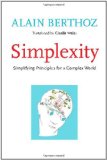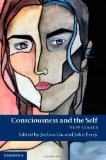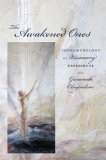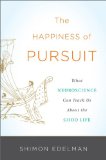January 23, 2012

Simplexity: Simplifying Principles for a Complex World (An Editions Odile Jacob Book) by Alain Berthoz, tr. Giselle Weiss (Yale University Press, 2012)
(kindle ed.), (amazon.co.uk)
Product description from the publisher:
In this book a noted physiologist and neuroscientist introduces the concept of simplexity, the set of solutions living organisms find that enable them to deal with information and situations, while taking into account past experiences and anticipating future ones. Such solutions are new ways of addressing problems so that actions may be taken more quickly, more elegantly, and more efficiently.
In a sense, the history of living organisms may be summed up by their remarkable ability to find solutions that avoid the world’s complexity by imposing on it their own rules and functions. Evolution has resolved the problem of complexity not by simplifying but by finding solutions whose processes—though they can sometimes be complex—allow us to act in the midst of complexity and of uncertainty. Nature can inspire us by making us realize that simplification is never simple and requires instead that we choose, refuse, connect, and imagine, in order to act in the best possible manner. Such solutions are already being applied in design and engineering and are significant in biology, medicine, economics, and the behavioral sciences.
Google books preview:
Comments (0)
- cognitive science,mind,new books
January 19, 2012

Consciousness and the Self: New Essays ed. by JeeLoo Liu and John Perry (Cambridge University Press, 2012)
(amazon.co.uk – 17 Nov 2011)
Product description from the publisher:
‘I never can catch myself at any time without a perception, and never can observe any thing but the perception.’ These famous words of David Hume, on his inability to perceive the self, set the stage for JeeLoo Liu and John Perry’s collection of essays on self-awareness and self-knowledge. This volume connects recent scientific studies on consciousness with the traditional issues about the self explored by Descartes, Locke and Hume. Experts in the field offer contrasting perspectives on matters such as the relation between consciousness and self-awareness, the notion of personhood and the epistemic access to one’s own thoughts, desires or attitudes. The volume will be of interest to philosophers, psychologists, neuroscientists, cognitive scientists and others working on the central topics of consciousness and the self.
Table of Contents
Introduction: consciousness and the self
1. Awareness and identification of self – David Rosenthal
2. Self-representationalism and the explanatory gap – Uriah Kriegel
3. Thinking about the self – John Perry
4. Ordinary self-consciousness – Lucy O’Brien
5. Waiting for the self – Jesse Prinz
6. I think I think, therefore I am – I think: skeptical doubts about self-knowledge – Fred Dretske
7. Knowing what I want – Alex Byrne
8. Self-ignorance – Eric Schwitzgebel
9. Personhood and consciousness – Sydney Shoemaker
10. My non-narrative, non-forensic Dasein: the first and second self – Owen Flanagan.
Comments (0)
- consciousness,new books,self
January 18, 2012

The Awakened Ones: Phenomenology of Visionary Experience by Gananath Obeyesekere (Columbia University Press)
(amazon.co.uk – 1 Feb)
Product description from the publisher:
While a rational consciousness grasps many truths, Gananath Obeyesekere believes an even richer knowledge is possible through a bold confrontation with the stuff of visions and dreams. Spanning both Buddhist and European forms of visionary experience, he fearlessly pursues the symbolic, nonrational depths of such phenomena, reawakening the intuitive, creative impulses that power greater understanding.
Throughout his career, Obeyesekere has combined psychoanalysis and anthropology to illuminate the relationship between personal symbolism and religious experience. In this book, he begins with Buddha’s visionary trances wherein, over the course of four hours, he witnesses hundreds of thousands of his past births and eons of world evolution, renewal, and disappearance. He then connects this fracturing of empirical and visionary time to the realm of space, considering the experience of a female Christian penitent, who stares devotedly at a tiny crucifix only to see the space around it expand to mirror Christ’s suffering. Obeyesekere follows the unconscious motivations underlying rapture, the fantastical consumption of Christ’s body and blood, and body mutilation and levitation, bridging medieval Catholicism and the movements of early modern thought as reflected in William Blake’s artistic visions and poetic dreams. He develops the term “dream-ego” through a discussion of visionary journeys, Carl Jung’s and Sigmund Freud’s scientific dreaming, and the cosmic and erotic dream-visions of New Age virtuosos, and he defines the parameters of a visionary mode of knowledge that provides a more elastic understanding of truth. A career-culminating work, this volume translates the epistemology of Hindu and Buddhist thinkers for western audiences while revitalizing western philosophical and scientific inquiry.
Comments (0)
- consciousness,culture,new books
January 17, 2012

The Happiness of Pursuit: What Neuroscience Can Teach Us About the Good Life by Shimon Edelman (Basic Books)
(amazon.co.uk – 16 Feb 2012)
Product description from the publisher:
When fishing for happiness, catch and release. Remember these seven words—they are the keys to being happy. So says Shimon Edelman, an expert on psychology and the mind.
In The Happiness of Pursuit, Edelman offers a fundamental understanding of pleasure and joy via the brain. Using the concept of the mind as a computing device, he unpacks how the human brain is highly active, involved in patterned networks, and constantly learning from experience. As our brains predict the future through pursuit of experience, we are rewarded both in real time and in the long run. Essentially, as Edelman discovers, it’s the journey, rather than the destination, that matters.
The idea that cognition is computation—the brain is a machine—is nothing new of course. But, as Edelman argues, the mind is actually a bundle of ongoing computations, essentially, the brain being one of many possible substrates that can support them. Edelman makes the case for these claims by constructing a conceptual toolbox that offers readers a glimpse of the computations underlying the mind’s faculties: perception, motivation and emotions, action, memory, thinking, social cognition, learning and language. It is this collection of tools that enables us to discover how and why happiness happens.
An informative, accessible, and witty tour of the mind, The Happiness of Pursuit offers insights to a thorough understanding of what minds are, how they relate to each other and to the world, and how we can make the best of it all.
See also: Author’s website
Comments (0)
- happiness,new books
January 16, 2012

The Poetry of Thought: From Hellenism to Celan by George Steiner (New Directions, 2012)
(amazon.co.uk – 15 Jan, but not yet released as of 16 Jan)
Product description from the publisher:
From the distinguished polymath George Steiner comes a profound and illuminating vision of the inseparability of Western philosophy and its living language.
With his hallmark forceful discernment, George Steiner presents in The Poetry of Thought his magnum opus: an examination of more than two millennia of Western culture, staking out his claim for the essential oneness of great thought and great style. Sweeping yet precise, moving from essential detail to bracing illustration, Steiner spans the entire history of philosophy in the West as it entwines with literature, finding that, as Sartre stated, in all philosophy there is “a hidden literary prose.”
“The poetic genius of abstract thought,” Steiner believes, “is lit, is made audible. Argument, even analytic, has its drumbeat. It is made ode. What voices the closing movements of Hegel’s Phenomenology better than Edith Piaf’s non de non, a twofold negation which Hegel would have prized? This essay is an attempt to listen more closely.”
Comments (0)
- culture,language,new books







